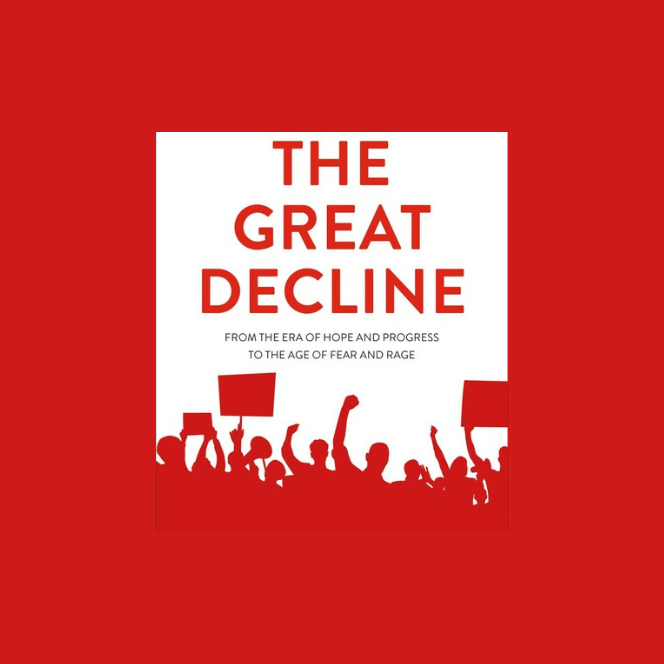In my recently published book, The Great Decline, I present a reappraisal of how we understand the relationship between individual and society, drawing on emerging evidence from neuroscience and epigenetics as well as sociology, arguing that reconceptualising this relationship in this way can potentially offer fresh insights regarding the troubling conditions of the recent past and present.
As to those troubles, I doubt that many would argue with the observation that we are experiencing one of the most turbulent periods since the 1930s. All around we see societies riven by growing polarization and conflict. Once confident if variously flawed democracies now threaten to collapse into variants of far-right authoritarianism amid a febrile social and political landscape, while numerous everyday lives seem plagued by endemic angst and proliferating personal ills. Unsurprisingly, I ascribe many of these troubles to the past 40-plus years of neoliberalism which, I propose, has had much deeper and broader negative implications than even previously understood, and also seems set to impede efforts to manage the further challenges posed by AI and climate change given the context of ongoing social, economic and political instability it has spawned.
As to my drawing on biology in approaching these issues, I’m aware of course that for most sociologists engaging with the biological is a highly controversial proposition. Hence, this remains largely excluded from sociological terrain and anathema to many due to its longstanding association with prejudicial right-wing ideologies, determinism, and so on. However, I also argue that recent developments not only refute the forms of outmoded pseudo-scientific and prejudicial biologically based discourses that sociologists understandably oppose but, conversely, are now offering robustly evidenced grounds for challenging the corrosive arrangements and inequities that continue to damage numerous lives. Moreover, rather than implying determinism, current findings also indicate we are caught up not only in the dynamic dialectical social process that sociologists are familiar with, but also in an ongoing biosocial process where major aspects of our neurological capacities and functioning shape important features of the social world while, reciprocally, our experience and action within that world impact on our biological development in crucial respects. This raises a wide range of issues albeit that only cursory engagement is possible here.
A critical issue in terms of our engagement with the world is that we are somewhat ill-equipped to confront the conditions we have created. Our development has endowed us with highly constrained conscious attentional capacities that are regularly tested by societal and technological complexity, too many simultaneous demands and environmental stimuli, a surfeit of novel situations where well-practiced routines seem inadequate, as well as challenges to the worldview, including norms and values, that we have internalised and rely upon to make sense of our experiences and guide our actions. When these limitations are tested, or expectations significantly challenged, as we know, we get stressed. A modicum of controlled short-term stress can be beneficial. However, acute and prolonged exposure can render us ever more vulnerable to environmental stressors, significantly where the amygdala (a key brain structure associated with fear, anger, as well as evaluation of experience), becomes sensitized and ‘trigger happy’. Importantly, related to this, uncontrolled stress can also impair the functioning of the prefrontal cortex (the PFC, centrally involved in working memory and executive function), further impeding conscious attention, higher-order thinking, reflection, and control of emotion.
What follows is that when we experience significant difficulty in dealing with the demands of living in complex societies, over time we have an increasing tendency to be driven by anger and fear, and less by clear thinking, rational reflection, and sober calculation as we engage with each other and the world around us. I have argued that this simple process is at the root of many contemporary ills, as populations exposed to the inequalities, insecurities, and injustices of living in hyper-mediated, status-obsessed, ‘aspirational’ turbo-capitalist neoliberal societies are beset by these negative emotions. In qualification, modern societies are inherently taxing for us. However, where we had once finally embarked on a faltering path towards establishing a semblance of order, security, and at least some promise of greater equity in the mid-20th Century, neoliberalism pulled this apart, once more advancing the ambitions of a cosseted and insulated minority at the expense of the health, wellbeing, and security of the masses.
Much current malaise, of course, manifests as personal distress evidenced in burgeoning mental ill health. As we know, however, such distress is also channeled outwards, amplified by social media algorithms and the opportunistic overtures of unscrupulous and bellicose populist politicians, exploiting tendencies towards anger, distrust and ‘othering’ exhibited by those exposed to these conditions, while diverting public ire from where it should be directed. This is where the roots of Brexit, Trumpism, and other motley forms of growing right-wing nationalism are cultivated.
The above conditions also generate epigenetic effects (changes to DNA expression without altering the DNA sequence) where chronic stress not only affects us neurologically but contributes to a wide range of physical illnesses and even the pace at which we age. Moreover, growing evidence suggests that socially acquired epigenetic changes affecting one generation, while potentially reversible, can be passed to the next, offering fresh insight regarding the serious negative impact of socio-economic insecurities and disparities. Where Bourdieu pointed to the transmission of social, cultural, and economic transgenerational inequalities, contemporary epigenetics’ identification of biologically heritable effects of adversity provides a further rationale for challenging socio-economic systems that currently blight the lives of succeeding generations.
With apologies for brevity and incompleteness here, as a huge amount has been necessarily glossed over, one current aim of my work is to persuade progressively minded sociologists that engaging with biology isn’t the preserve of the right, as the growing evidence I refer to does not support their ideological position but offers grounds to challenge it. As above, it is also now becoming clear that as we shape economy and society we shape ourselves, not just culturally but biologically, not just in the present but potentially into the future, while an understanding of these processes surely must reside within the purview of the sociologist. Read more about my work in my book, The Great Decline.
John Bone is Professor of Sociology at the University of Aberdeen and past Chair of the British Sociological Association. His research interests are in political economy, social and biosocial theory, inequalities, just transitions and health and well-being research. Twitter: @JohnDBone


